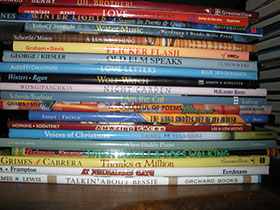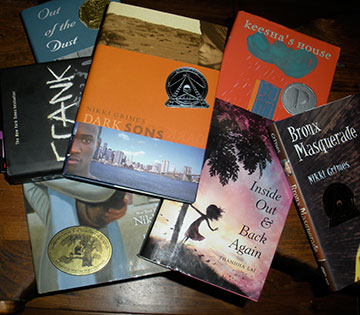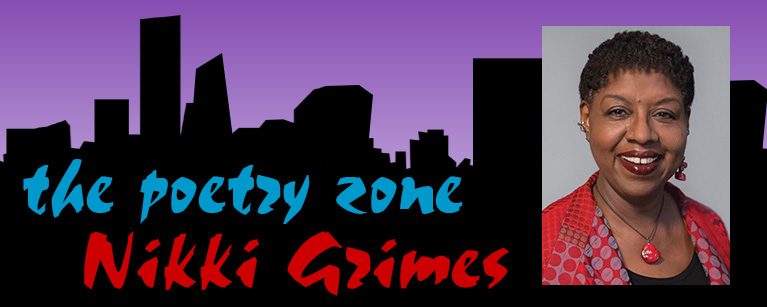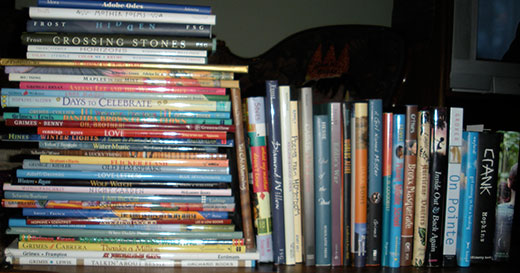For the record, just because a particular notion is repeated, over and over again, doesn’t necessarily make it true. The earth is not flat, nor is it the center of the universe. People of African descent are not intellectually inferior to the white race. And contrary to what you may have heard, over the years, from (well-meaning?) editors and agents, poetry can, and does, sell.
Pardon me if I presume to know what I’m talking about, but I am, in fact, sitting on a lovely sofa, set in a small, but beautiful home, paid for by a career built on writing children’s poetry and novels-in-verse. I believe that qualifies to say a thing or two on the subject, yes?
 I recently spoke at a conference at which I heard it stated, unequivocally, that poetry doesn’t sell. When those words hit the air, I wanted to leap out of my skin. I’ve been hearing that old adage since I first entered this field more than 30 years ago. Had I, for a moment, taken that oft-repeated statement to heart, I’d have no career. The 50-plus books I’ve published, most of them children’s poetry, or novels-in-verse, would not exist. I would never have won the NCTE Award for Excellence in Children’s Poetry, nor awards for my body of work, or the ALA Notables, Coretta Scott King Award and Honors, or any of the other awards and citations my poetry has earned. None of it would exist if I’d believed that well-worn idea.
I recently spoke at a conference at which I heard it stated, unequivocally, that poetry doesn’t sell. When those words hit the air, I wanted to leap out of my skin. I’ve been hearing that old adage since I first entered this field more than 30 years ago. Had I, for a moment, taken that oft-repeated statement to heart, I’d have no career. The 50-plus books I’ve published, most of them children’s poetry, or novels-in-verse, would not exist. I would never have won the NCTE Award for Excellence in Children’s Poetry, nor awards for my body of work, or the ALA Notables, Coretta Scott King Award and Honors, or any of the other awards and citations my poetry has earned. None of it would exist if I’d believed that well-worn idea.
To be fair, if you are a poet, it is highly unlikely that you will become wealthy working in this genre, no matter how well you hone your craft. That much is true. But chances are, you already know that. I would wager that most writers, keen on this particular genre, aren’t looking to make a killing in the marketplace. They simply have a penchant for the lyrical line, and a passion for metaphor. Like me, they pen poetry because they, quite frankly, can’t help themselves. Poetry is in them. It’s part of their DNA. Poets don’t value their work in terms of fiscal weight, and that’s where we differ from agents and editors.
Agents and publishers are in the business of making money by selling books. We all understand that, although I wish interest in producing a rich and diverse variety of quality literature for the next generation, were more widespread. Still, we shouldn’t be surprised when agents and publishers push for vampire lore while the genre is hot, or discourage dystopian novels when they feel the trend is waning. Not so long ago, writers were dissuaded from creating books for teens, as there was yet no perceived market for them. That makes sense, right?
But. Aren’t we glad Judy Blume ignored the naysayers, back in the bad old days, and wrote novels for teens anyway? Aren’t we glad Jack Prelutsky and Shel Silverstein beat the poetry drum before verse was in vogue? Aren’t we grateful for Myra Cohn Livingston, and Eloise Greenfield, and Lucille Clifton, and Arnold Adoff, and a host of other poets who’ve enriched the lives of young readers?
I attended the first inauguration of President Obama, in 2009. One of my favorite moments of the ceremony was the reading of a poem. I love that poetry has played a part in inaugural celebrations of the past. Each time a poet has risen to that great podium it is a reminder that this genre has something substantial to offer. Poetry can provoke, challenge, disturb. It can soothe our souls, or spur us on to greatness. It can inspire, uplift, and make the heart soar. However, poetry can accomplish none of these things if it is not written.
I’m all for being honest with poets about the realities of the marketplace. I know that poetry, in the main, does not sell as well as prose. But it can, and does, sell. Is the field extraordinarily competitive? Absolutely. Is crafting quality poetry difficult? Of course it is. All good writing involves a huge investment of time, energy, and often, research. But that’s a lousy excuse for telling a gifted poet, who has a hankering for haiku, who eats and sleeps simile, who mires himself in metaphor that he or she should give up the very idea of penning poetry as a literary career.
Here are a few thoughts: the next time you come across a poet who clearly demonstrates a gift for this genre, don’t tell him to hide his light under a basket. Instead, tell poets to be smart about their choice of subject, to research the market to make sure their ideas haven’t already been done, to consider the needs of school curriculum and shape their work accordingly so that their books of poetry will be as marketable as possible. Encourage them to consider narrative books in verse—novels, biographies, historical fiction, creative non-fiction.
On the other hand, if the writer has no gift for this genre, tell him so. If his poetry is not topical, tell him that. If his poetry is not age-appropriate, tell him that. If you, personally, lack the know-how, or frankly, the interest in selling poetry, tell him that. But please, whatever you do, don’t tell a poet not to be a poet. That’s a bit like telling a leopard not to have spots!
 One last thing: While poetry may, indeed, be difficult to place, it is not impossible. So please, please stop telling tomorrow’s poets that poetry doesn’t sell. If you do, you might as well tell them that New York Times bestseller Ellen Hopkins is a figment of our collective imagination; that Sonya Sones and Prince Honoree Helen Frost do not exist; that Newbery Honoree Joyce Sidman does not exist; that J. Patrick Lewis, and Naomi Shihab Nye, and Paul B. Janeczko, and Jack Prelutsky, and Sara Holbrook, and Jamie Adoff, and Tony Medina, and Marilyn Nelson, and Georgia Heard, and Marilyn Singer, and X.J. Kennedy, and Jane Yolen, and Margarita Engle, and Lee Bennett Hopkins, and Pat Mora, and Allan Wolf, and Gary Soto, and Eloise Greenfield, and Nikki Grimes, and a host of other working, publishing, award-winning poets do not exist. And that, my dears, simply isn’t true.
One last thing: While poetry may, indeed, be difficult to place, it is not impossible. So please, please stop telling tomorrow’s poets that poetry doesn’t sell. If you do, you might as well tell them that New York Times bestseller Ellen Hopkins is a figment of our collective imagination; that Sonya Sones and Prince Honoree Helen Frost do not exist; that Newbery Honoree Joyce Sidman does not exist; that J. Patrick Lewis, and Naomi Shihab Nye, and Paul B. Janeczko, and Jack Prelutsky, and Sara Holbrook, and Jamie Adoff, and Tony Medina, and Marilyn Nelson, and Georgia Heard, and Marilyn Singer, and X.J. Kennedy, and Jane Yolen, and Margarita Engle, and Lee Bennett Hopkins, and Pat Mora, and Allan Wolf, and Gary Soto, and Eloise Greenfield, and Nikki Grimes, and a host of other working, publishing, award-winning poets do not exist. And that, my dears, simply isn’t true.




35 Responses
Good job.
Hallelujah and hurrah, Nikki! Thank you for saying what needs to be said.
Nikki, you are such a treasure, your work such a gift to children and teens. Thank you for including me in this good company. We do indeed exist.
Ms. Grimes, thank you. I write poetry, I read poetry, I listen to poetry. I am immersing my 6th grade students (having immersed myself first) in a mass of verse novels at present, several of which are yours.
You inspire me.
THANK YOU!!
I feel your passion. In fact, I started reading faster with more conviction as I read through your blog.
Please indulge a poetry plug and consider attending Austin International Poetry Festival for their 21st anniversary April 11–14 in Austin, TX. See aipf.org for more details.
Sounds like a great festival! Perhaps I’ll be invited, one of these years. My schedule won’t allow for me to come this year, in any case.
Thanks for taking the time to leave a nice comment!
Very well said, Nikki — I hope agents, editors, and publishers read this! As someone who’s been struggling to find publication, it’s reassuring to know there might be a light at the end of the proverbial tunnel. Personally, I’ve never understand the rationale behind the idea that poetry doesn’t sell; if young children love nursery rhymes and singalongs, older kids enjoy rhyming picture books, and teenagers can’t even function without their iPods, why WOULDN’T poetry sell??
Keep up the good work, and thanks for posting.
Wonderful post, Nikki. Let’s all spread the word, for goodness’ sake!
Thank you, Nikki, and keep preaching that message, we need to hear it!
Amen, Nikki! I so agree. And not only do poets create amazing work and not only does poetry sell, KIDS LOVE POETRY! They take to it easily and naturally and musically. It’s the adult gatekeepers of agencies, publishing houses, schools and libraries who are revealing their ignorance or naivete when they make such claims that poetry has no audience. Kids love the humor, rhythm, and pathos of poetry– and they deserve the best and plenty of it!
You, my friend, are one of the reasons our poetry continues to sell! Thanks for all you do to promote it. And thanks for taking time to leave your wonderful comment.
Hear, hear! I am also struck by the irony that all those song lyrics people listen to every day are poems.
Great article!
As a haiku poet, and one who earns money from running online and ‘physical’ workshops on haiku (and tanka) it’s often seen as a dirty profession by some who feel we shouldn’t make money from it, and dirty by those who feel we should.
There are young people coming to poetry and earning money because they work hard and audiences delight in them. I have twenty years of encouraging poets from all disciplines, regardless of their age, to have a go, work at it, perservere, and you’ll be rewarded.
I’m hardly proven wrong, not because I’m wise (although wisdom comes from making a helluva lot of mistakes ) but someone who sees it as a job, a profession, a passion and love of their life all rolled into one, they are going to succeed.
Alan, With Words
What a great essay! We love you, Nikki Grimes!
Thanks, Marilyn! Just pass it on! The more people read this, the better.
Thank you SO much for this inspirational blog post. As a poet who continues to hone and improve my skills, I needed these words today. =)
Oops. Correct website.
Thank you, Nikki, for posting this. And for mentioning my very first professor in Children’s Literature and poetry, the wonderful Lucille Clifton. I am indebted to poets of your generation for inspiring me. Thank you!
You were indeed blessed to have Lucille Clifton as your professor! She ranks at the very top of my list of great poets. She was also just a lovely, lovely woman. Stay inspired!
Thank you for this wonderful testimonial for poetry.
Yes! And I just received my first royalty check from my first book, which is a book of poetry!
Congrats!
Amen! It’s lovely to hear someone address this so eloquently (and with so much authority and passion)!
I love every word of this, from lovely sofa to lyrical poets. Thank you, Nikki, for your inspiration, insight, and wise advice. May all of us who love and believe in the importance of children’s literature continue to grow a collective body of poetic work with the substance, excellence, and imagination young readers thrive on.
You totally GO, girl!
Fabulous post! You put everything so beautifully.
I have a verse novel coming out with FSG in 2013 — and I’m so, so glad I didn’t listen to the person who told me (when I was at a tender age) that I would “never get anywhere writing poetry”.
Congrats on your new book! What’s the title? I’ll want to look for it to add to my collection.
Dear Nikki, I do love your positive attitude and yes, I would never have been published if I hadn’t had hope, persistence and willingness to learn my craft. But here in the UK, the poetry market has almost vanished. Many of my publishers have stopped doing poetry lists and also, many schools that once bought my poetry books, including anthologies and verse novels, now only take free material from the net, particularly since the recession. I still believe in the importance in poetry for young people as it is where I started 25 years ago, and have been honoured to get ALA notable and the Claudia Lewis poetry award for Here’s a Little poem, which I did with Jane Yolen. So, in the US I can still see a vibrant market. But sadly, most of my income now is from fiction and a new collection of nature poems for children will probably only find a home with one of the small presses. But I will keep writing, as that is what I do best {and performing in schools} All best, Andrew Fusek Peters
It is no surprise that even this essay about poetry is poetic. There are so many lines and phrases to love in this piece: “Poets don’t value their work in terms of fiscal weight…” and “…a gifted poet, who has a hankering for haiku, who eats and sleeps simile, who mires himself in metaphor…”
I, too, an enamored with the fact that the U.S. has a poet laureate. It is, admittedly, the only reason I look forward to the Presidential inaugural address no matter who is speaking.
I am an 8th grade language arts teacher and I have many of the books in your pictures on my classroom library shelves. Not only do I purchase a great deal of poetry, but students READ it! I can’t even count how many copies of Bronx Masquerade I’ve purchased because year after year my students love the life right out of my copies. Thanks for writing the poetry and sharing your voice here.
Hi. This is Paula Yoo. I took your poetry class at the SCBWI Writers Day conference this past weekend. It was an honor to study with you and I learned a lot. Thank you! I read your latest blog and agree with your assessment. #TeamPoetry! 🙂 PS. I also posted a blog about your wonderful class. Thank you again for your amazing class. Sincerely, Paula
Thank you, Nikki Grimes! Reading your work and some of the others that you mentioned, give me great hope. Maybe poetry isn’t as easy to market, but it certainly feeds the soul.
Thank you Nikki for your inspiring piece. I am an Irish woman living in
Provence France. I have a body of work waiting for a home between pages. Your words, so encouraging, are helping me to find the energy to find a publisher. I organise a Poetry Corner in Aix en Provence…you are always welcome.
With every good wish,
Sheighle Birdthistle.
Thank you Nikki. I was told by an educational publisher that I must find a children’s literary agent in order to submit my work to him. I spent the whole of last year going through the Children’s Writers’ & Artists’ Yearbook but not one would touch poetry and yet I’ve market-researched these poems on thousands of children and their teachers and they are much loved. Can you recommend anyone?
This was perfectly written. We need more articles like this. Thank you.
THANK YOU for sharing this information… long overdue!!!!